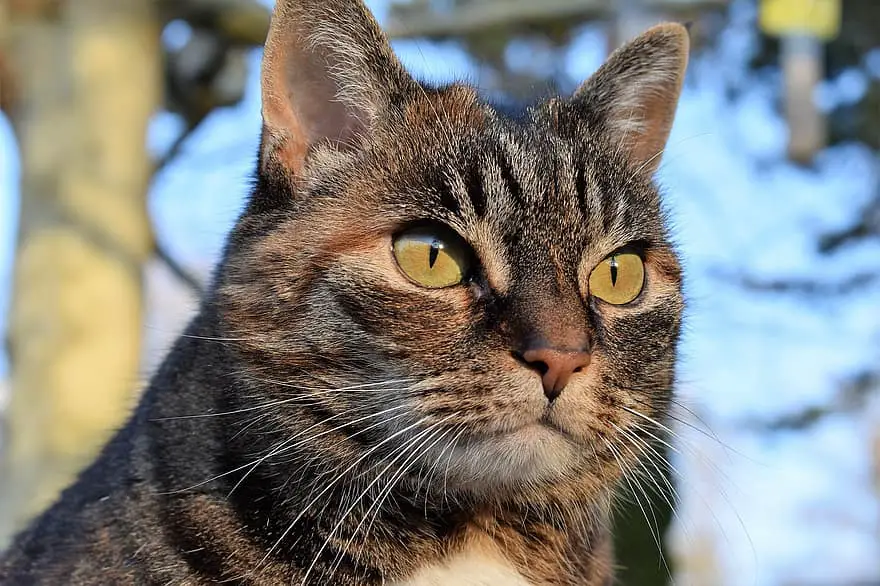Sleeping in on the weekend – what a pleasure! If it weren’t for the beloved cat that lurks in bed at 6:30 a.m. sharp. Jumping onto our mattress, she grabs one paw at the nose of her slumbering keeper. Gone are the daydreams – it’s feeding time! When we are already awake, we would also like to know: Do some cats have an extremely good sense of time, or are their stomachs growling?
On-Time at the Food Bowl: the Cat’s Internal Clock
Cats love routine. It gives them security and structure to the cat’s everyday life. Cats adapt their biorhythm to human habits. Especially house cats adjust to the rhythm of their owners. Some cats have an internal clock that is almost precise to the minute, others are more casual when it comes to times. Some people therefore not only ask for their breakfast on time but also prefer to go to bed on time. That’s why they moan in the bathroom until their can opener finally brushes its teeth and gets ready for bed.
With little tricks, you can try to get more sleep on the weekend
Rather, the first trick is a parenting tip that works the better the sooner you start. It reads:
Get your cat used to irregular getting up times.
With freshly moved cats, stay in bed longer on the weekend or try to get up half an hour earlier every week. Many cats learn that the morning routine is not perfectly predictable and become more patient. Old cats should continue to indulge in the routine. Alternatively, it can help if you feed the cat later in the evening when you want to sleep the next day. Or you can feed the velvet paw and then shuffle back to bed for another good night’s sleep. However, not all cats are satisfied with breakfast. Indoor cats in particular wait for the first round of cuddling or playing.
More Than Just Routine: Do Cats Have a Sense of Time?

Sensing time – what does that actually mean? In addition to perceiving minutes and hours or days, it is also about differentiating the past, present, and future. We assume that cats can learn processes, but have no awareness of time in the form of “yesterday”, “today” and “tomorrow”. They are just as uninterested in the past as they are in planning for the future.
That doesn’t stop them from reading certain signals: Putting out the transport basket means it’s going to the vet – and whoosh, the velvet paw is gone. So she can perceive concrete chronological sequences. This improves the perception of time in everyday life. Cats read small signals: the tram that leaves from 5 a.m., the chirping of birds, the twilight, or changes in the sleep phases of their can openers. It can also store bad or good experiences with people, animals, and places. All of this feeds our cat’s internal clock, which also controls the hormones serotonin and melatonin.
Do Cats Know How Long They Have Been Alone?
Three weeks of vacation in the Caribbean are planned and the cats are in the care of the nice neighbors. But the guilty conscience announces: will the cats miss us? After all, three weeks is a long time! On the other hand, one can read again and again that cats have no sense of whether they are alone for hours or days anyway. There are no arguments to back up this daring thesis. Of course, cats don’t know what to do with the term “week”. But many house tigers behave differently when their keepers are absent when they receive little or no attention.
It is important that the cats have positive experiences and activities despite their vacation.
Because we all know from our own experience how long times can seem to us. If we are in an exciting conversation or if we are in a particular hurry because we have a lot to do, time flies by. If we sit in a tiring speech or wait for the next train, time stretches like chewing gum. It can be assumed that cats feel the same way.
Indoor cats in particular are at risk of long monotony. Too much of this can lead to behavior problems. So it is better to give the velvet paw to friends or to find someone who lives in the apartment. Tip: If you like to travel, get your cat used to their holiday residence from an early age. House tigers who live in pairs can at least keep busy with each other. Outdoor animals that a friendly neighbor takes care of prefer to stay in their own territory, which also offers them variety – so the time without you will not be too long.
And what about pouting after a vacation that some cat owners talk about? Cats cannot “sulk” because they have no awareness of wrongdoing. When a cat withdraws, it shows that it is particularly sensitive. The lack of the usual rituals unsettled her. The internal clock is out of step. When their owners come back home, these velvet paws need some time to get used to the new situation again and to trust everyday life again.

